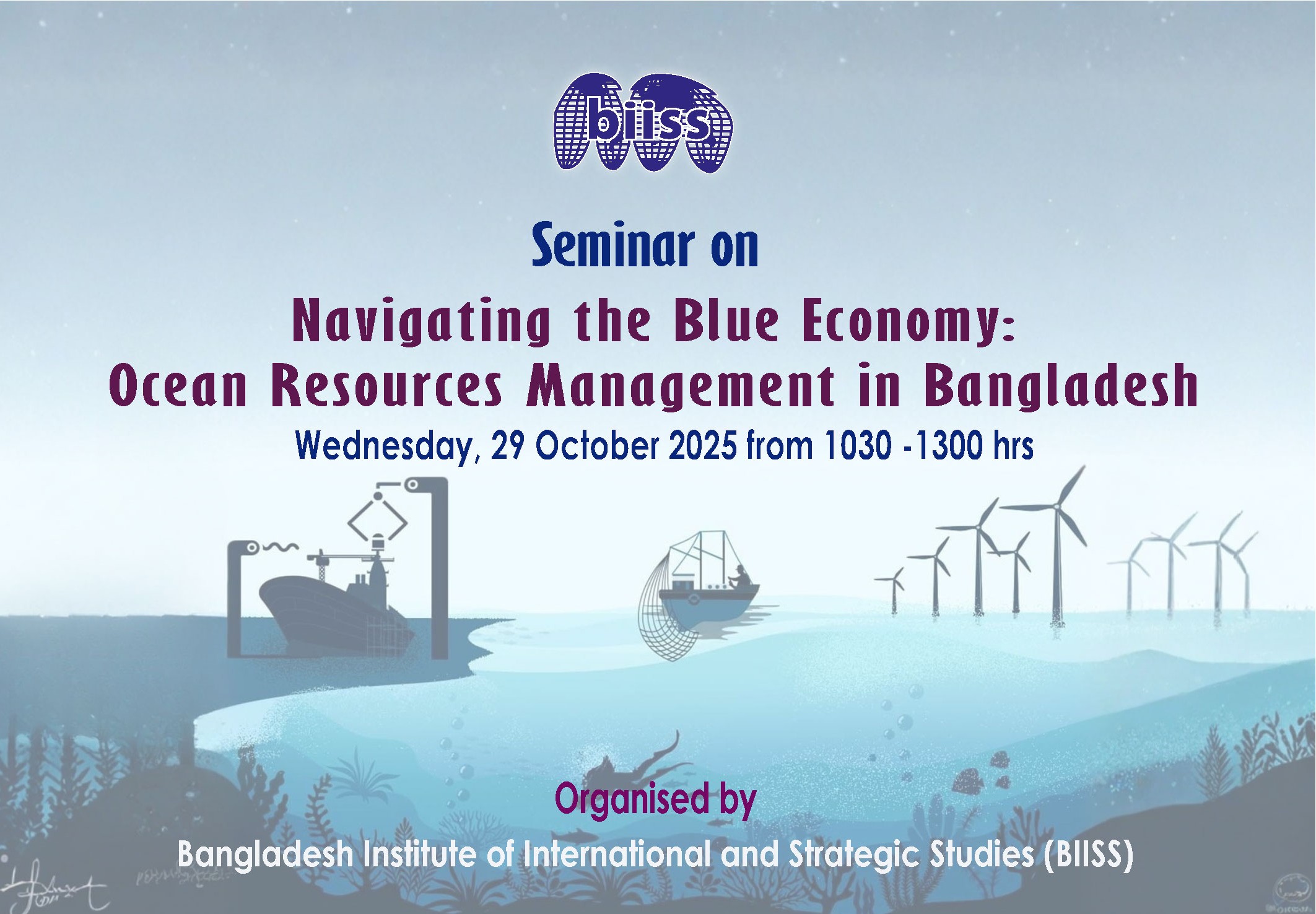Ocean Resources Management in Bangladesh on 29 October 2025

Seminar on Navigating the Blue Economy: Ocean Resources Management in Bangladesh on 29 October 2025
Background
Bangladesh’s growing population and shrinking land resources are pushing the nation to tap into its maritime potential. The Bay of Bengal (BoB) is central to this effort—not only for its rich marine resources but also for its strategic location, as over 90% of Bangladesh’s trade moves through sea routes. Peaceful resolution of maritime disputes has further reinforced the need to maximise ocean-based opportunities for economic growth. The concept of the Blue Economy, introduced by Gunter Pauli in 1994 and later emphasised at the Rio+20 Summit in 2012, promotes growth that aligns with the resilience and sustainability of ocean ecosystems. Bangladesh recognises the ocean’s role in poverty reduction, food security, climate adaptation, and the creation of new economic opportunities. To fully harness these prospects, Bangladesh needs an integrated ocean resource management framework that balances exploitation with conservation, ensures inter-sectoral coordination, and safeguards marine biodiversity while supporting economic development. Government priorities and literature identify key blue economy sectors: marine fisheries, tourism, shipping and transport, renewable energy, shipbuilding and recycling, marine biotechnology etc. Together, these sectors—underpinned by integrated resource management—present vast opportunities for Bangladesh’s strategic and sustainable development.
Bangladesh’s maritime area holds immense biological and economic value, making effective ocean governance essential for protecting resources and ensuring sustainable use. The Bay is rich in fisheries, marine plants and animals, oil and gas reserves, and other seabed resources, yet the country lacks a comprehensive governance framework to safeguard them. Over the years, Bangladesh has introduced several laws and policies to regulate its maritime domain. These include acts and policies governing territorial waters, fisheries, petroleum exploration, ports, shipping, environmental protection, and maritime security through the navy and coast guard. While these instruments address sectoral needs, they often operate in isolation and with limited focus on emerging challenges such as climate change and coastal infrastructure pressures. To achieve sustainable growth, Bangladesh requires an integrated and coordinated ocean governance system that balances resource use with conservation, enhances maritime safety, and aligns sectoral policies under a unified framework. Such an approach is vital for protecting marine wealth, promoting economic development, and strengthening national security.
Ensuring the sustainable use of ocean resources is critical for Bangladesh’s long-term prosperity and environmental security. Sustainable practices in fisheries, for instance, can prevent overexploitation, maintain biodiversity, and secure a steady supply of protein for millions of people who depend on seafood for their livelihoods and nutrition. Similarly, tapping into renewable offshore energy—such as wind, tidal, and wave power—can diversify the country’s energy mix, reduce dependence on fossil fuels, and contribute to climate 2 mitigation goals. Beyond food and energy, sustainable ocean management opens avenues for economic growth through eco-tourism, marine biotechnology, and shipping and transport. Eco-tourism can create employment opportunities while preserving natural habitats, and marine biotechnology can lead to innovations in pharmaceuticals, agriculture, and industrial applications without harming the environment. Balancing resource exploitation with conservation ensures that marine ecosystems—mangroves, coral reefs, seagrass beds, and wetlands—continue to provide critical ecosystem services, including coastal protection against storms, carbon sequestration, and habitat for marine life. By integrating sustainable practices with technological innovation, community engagement, and policy coordination, Bangladesh can harness its ocean wealth to reduce poverty, strengthen resilience to climate change, ensure food security, and promote inclusive and environmentally responsible blue growth.
Regional cooperation is vital for effective integrated ocean management, as the Bay of Bengal’s marine ecosystems and resources transcend national boundaries. Collaborative efforts with neighbouring countries enable shared scientific research, coordinated fisheries management, joint monitoring of maritime security, and unified strategies to combat illegal, unreported, and unregulated (IUU) fishing. It also allows for collective responses to climate-related challenges, such as sea-level rise, cyclones, and coastal erosion, while promoting sustainable shipping, trade, and energy development. Strengthening regional partnerships through agreements, knowledge exchange, and capacity-building initiatives ensures that ocean resources are used efficiently, equitably, and sustainably for the benefit of all countries in the region.
Objectives
Against this backdrop, the Bangladesh Institute of International and Strategic Studies (BIISS) intends to organise a seminar, titled “Navigating the Blue Economy: Ocean Resources Management in Bangladesh”, to exchange ideas, thoughts, and share experiences of experts working in the arena of blue economy and marine resources management. The following are the specific issues to be discussed at the seminar:
• Ensuring Sustainable Exploitation of Bangladesh’s Ocean Resources: Opportunities and Constraints
• Towards Integrated Ocean Management: Strategic Priorities and Regional Cooperation in the Bay of Bengal
• Legal and Institutional Frameworks for Ocean Governance in Bangladesh
Participants
The participants will be experts and dignitaries with in-depth knowledge and understanding of the current state of the blue economy and ocean resource management in the Bay of Bengal region, as well as the required policy actions for Bangladesh in this regard. Moreover, government officials, researchers, diplomats, and representatives from relevant organisations will also be present. The seminar will be streamed on social media platforms such as Facebook and YouTube. National electronic and print media will be invited to cover the seminar.